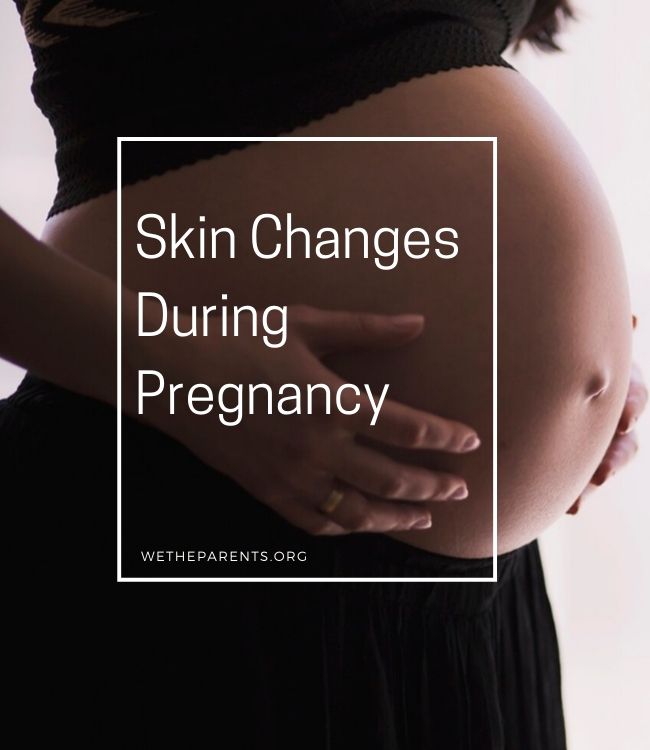Do you find yourself standing in front of the mirror, wondering what happened to your skin? Maybe you’ve noticed new lines, or perhaps some puzzling dark spots seem to have popped up overnight.
Whether you’re currently expecting, or looking curiously forward before you expand your family, skin changes during pregnancy are a totally normal part of the journey.
Type of skin changes during pregnancy
Stretch marks
Arguably the most famous of all pregnancy skin changes, stretch marks, also known as striae gravidarum, are almost inevitable. About 90% of women will find themselves sporting stripes by the seventh month of their pregnancy.
Causes
Your skin has three main layers, and the middle layer, the dermis, is to blame for stretch marks. Between healthy weight gain and an expanding bump, your skin needs to expand somewhat rapidly to accommodate your changing body.
When this happens, tears form in the dermis, and deeper skin layers peek through to the surface.
Risk factors
Interestingly, the presence of stretch marks on your thighs decreases the risk of getting them during pregnancy.1Risk factors of striae gravidarum
onlinelibrary.wiley.com
However, certain factors increase your risk of stretch marks during pregnancy.
- Your mother had stretch marks during her pregnancy
- Elevated body mass index before pregnancy
- Stretch marks on your breasts
- You gain weight rapidly during your pregnancy
Minimizing the appearance of stretch marks
Stretch marks are virtually impossible to prevent, especially if you have genetic relatives who donned the stripes during their pregnancies.
With that said, some studies have shown that applying a cream containing onion extract, hyaluronic acid don’t let the name scare you, and Centella asiatica extract may minimize the appearance of stretch marks.2Human health implications of organic food and organic agriculture: a comprehensive review
ncbi.nlm.nih.gov
When it comes to weight gain, you want to aim towards slow and steady, while trying to avoid rapid spurts as much as possible. Talk to your OB provider about how to eat a well-rounded diet that will support collagen development and overall wellness. Be sure you’re getting enough zinc, protein, and vitamins C, D, and E.
And finally, try to stay active. I know, easier said than done, but exercises like walking, swimming, or yoga can help regulate weight gain.
Treatment
There are plenty of creams on the market that can help reduce the appearance of stretch marks by way of moisturizing ingredients and vitamins. Among my favorites is Bio Oil’s Skincare Oil, as it contains plenty of vitamin E and doesn’t leave a greasy film in its wake.
For stubborn stretch marks that just won’t fade, talk to a dermatologist about microdermabrasion, laser treatments, or chemical peels.
Acne breakouts
About 40% of women will experience some form of acne during their pregnancy, even those who had previously enjoyed clear skin their whole lives. Pregnancy-related acne often occurs during the first trimester and can last throughout your pregnancy.
Causes
As your hormone levels rise, your skin will naturally begin to produce more oils. This increase in natural oils can cause clogged pores, which, in turn, can lead to breakouts reminiscent of your high school days.
Risk factors
- Having a history of acne
- Experience flares of acne during the start of the menstrual cycle
Minimizing breakouts
Be sure to keep up with your skincare routine, including
- Cleansing with a gentle face wash
- Removing your makeup at the end of the day
- Avoiding heavy cosmetics that might further clog your pores
Treatment
It can be tempting to knock those breakouts back with your usual methods of over-the-counter creams or prescription medication, but you should not do this.
The best way to treat pregnancy-related acne is through good hygiene habits, such as:
- Washing your face no more than twice a day and patting dry with a clean cloth
- Not touching your face in any way
- Keeping your hair washed to help control an oily scalp
- Changing your pillowcases often
- Not popping or picking at pimples
- Using earphones when talking on the phone to avoid pressing it against your skin
- Never rubbing or itching at your face
- If none of these work, speak with your OB provider about topical medications like antibiotics, benzoyl peroxide, salicylic acid, and azelaic acid3Human health implications of organic food and organic agriculture: a comprehensive review Axel Mie,corresponding author1,2 Helle Raun Andersen,3 Stefan Gunnarsson,4 Johannes Kahl,5 Emmanuelle Kesse-Guyot,6 Ewa Rembiałkowska,7 Gianluca Quaglio,8 and Philippe Grandjean3,9
www.ncbi.nlm.nih.gov
You should avoid
- Isotretinoin
- Retinoid creams
- Hormone therapies
Hives
While less common than acne, itchy hives can be an irritating issue during pregnancy. Worse yet, hives that are part of an anaphylactic reaction can be catastrophic for mom and baby.4Sarna Sensitive Steroid-Free Anti-Itch Lotion for Dry Irritated Skin
amazon.com
Causes
All the expected culprits can cause pregnancy hives, including bug bites, animal dander, foods you’re allergic to, and chemicals that have previously caused adverse reactions to your skin.
Since you’re exposed to regular medical care in pregnancy, you may discover an unknown allergy to medication or latex.
If the hives are associated with any symptoms like intense itching, swelling of your throat, or difficulty breathing, then call 911. If the reaction is less severe and you can safely swallow, take an antihistamine like diphenhydramine.
Risk Factors
A history of allergies.
Minimizing hive flareups
You should avoid ingesting or coming into contact with things that generally trigger your allergies as much as possible. Furthermore, you should:
- Wear loose-fitting clothing to avoid any excess rubbing.
- Shower in warm, not hot, water.
- Practice good stress management.
- Don’t scratch at your skin.
- Keep your skin moisturized.
Treatment
For severe cases, contact your doctor before taking any over-the-counter antihistamines. For a soothing home remedy, try a relaxing oatmeal bath or apply aloe vera to ease any itchiness.
PUPPP
Pruritic urticarial papules and plaques of pregnancy, or PUPPP, can appear during the third trimester and is sometimes mistaken for hives. It frequently starts on the abdomen but may then spread to the arms or legs.
PUPPPS presents with raised red patches with a splotchy, rash-like appearance and initially show up on stretch marks. These bumps can be extremely itchy.
Causes
PUPPPS is likely caused by the rapid skin stretching that occurs in the later months of pregnancy, but may also be related to hormonal changes.5Pruritic urticarial papules and plaques of pregnancy: polymorphic eruption of pregnancy (PUPPP)
sciencedirect.com
Risk Factors
- Rapid weight gain
- Caucasian ancestry
- Pregnant with multiples
- Experiencing your first pregnancy
Minimizing the risk for PUPPPS
Unfortunately, there is not much to be done by way of prevention.
Treatment
Thankfully, PUPPPS will clear up on its own shortly after your baby arrives. To help alleviate symptoms, you can try:
- Oatmeal baths
- Regularly moisturizing
- Cool compresses
When dealing with severe itching and discomfort, talk to your doctor about trying:
- Topical steroid creams
- Anti-itch lotion like Sarna
- Antihistamines
- Oral steroid pills
Eczema
Eczema is characterized by rough, red bumps that are itchy and may have visible pustules. Eczema can appear anywhere on the body.
Causes
Certain people may have a genetic predisposition that doesn’t allow their skin to retain moisture as efficiently as those unaffected.
Triggers, such as harsh chemicals, rough materials, and pollutants, can easily irritate the skin and cause the scaly, irritating patches for which eczema is known.
Risk Factors
Having eczema pre-pregnancy
Minimizing eczema flareups
Although eczema isn’t preventable, you can help decrease the chances of a severe outbreak by:
- Maintaining low stress
- Moisturizing regularly
- Avoiding scratchy clothing
- Staying cool to reduce sweating
- Using gentle soaps, shampoos, and detergents
- Using a humidifier in your home
Treatment
Most eczema flares are easily controlled through medicated ointments or by simply using a quality moisturizer.
Treatment options are more limited during pregnancy.6Weatherhead, S., Robson, S. C., & Reynolds, N. J. (2007). Eczema in pregnancy. Bmj, 335(7611), 152-154.
ncbi.nlm.nih.govFor severe outbreaks, you can contact your doctor, who might provide a pregnancy-safe steroid cream.
UV light therapy has also proven successful at getting those uncomfortable patches under control. These sessions are performed several times per week until symptoms improve or resolve. Speak to a dermatologist to see if this is appropriate.7What is phototherapy?
eczema.org
Varicose veins
Often seen as a spider web of blue, red, or purple lines, varicose veins commonly occur on the legs during pregnancy.
They can cause throbbing, itchiness, a heavy feeling in the affected limb, and swelling. Some women experience a significant level of pain. Hemorrhoids are another form of varicose veins.
Causes
While your blood volume will increase dramatically during pregnancy, the amount of blood that flows from your legs upwards actually decreases, and additional pressure is put on your veins.
Risk Factors
- A sedentary lifestyle
- Standing for long periods
- Having a genetic history of varicose veins
- Constipation (for hemorrhoids)
Minimizing the risk of varicose veins
While not always preventable, you may be able to avoid or minimize existing varicose veins by:
- Wearing flat, comfortable shoes
- Not sitting or standing in one position for prolonged periods
- Sleeping on your left side
- Wearing compression hosiery
- Eating a healthy diet rich in fiber and vitamin C
- Elevating your legs when sitting
- Staying hydrated
- Avoiding excess sodium
- Remaining active
Treatment
Varicose veins that appear during pregnancy will likely resolve themselves a few months after you have given birth. Ask your doctor about surgical options for stubborn veins that just won’t return to normal.
Linea nigra
Appearing as a vertical line up to half an inch wide and travels over your belly into your pubic area, this mark usually makes its appearance in the fifth month of pregnancy.
Causes
Exactly why this distinctive line appears in 90% of pregnancies remains a mystery. Some think that humans always have that line on their torsos and that pregnancy merely makes it stand out. Another possibility is that a melanocyte-stimulating hormone is responsible.
Risk Factors
- Exposure to sunlight
- A darker skin tone (increased melanin)
Minimizing the appearance of linea nigra
Unfortunately, there’s no way to prevent this skin condition. With that said, some women swear by unproven home-lightening remedies such as:
- Apple cider vinegar
- Milk of magnesia
- Lemon juice
Treatment
Don’t worry about lightening this line at home. Your best bet is to just wait this one out. Most cases resolve on their own, post-delivery.
In the meantime, avoid bleaching creams and exposing your belly to direct sunlight.
Melasma
Often referred to as the mask of pregnancy, this skin change manifests itself in brown facial patches on the cheeks, forehead, nose, or chin.
Causes
Thought to be rooted in hormonal changes, doctors aren’t entirely sure what causes these skin patches to appear.
Risk factors
- Darker skin tones
- Genetics
Minimizing the appearance of melasma
Due to the likelihood of hormones causing this skin change, there is little that can prevent or lessen its occurrence.
Treatment
When caused by pregnancy, Melasma generally resolves itself. If it seems to be lingering, you can speak to your doctor about treatments such as:
- Topical creams or ointments
- Microdermabrasion
- Laser therapy
- Chemical peels
Wrapping up
Your skin will experience a lot throughout pregnancy. From that beautiful pregnancy glow to the frustrating breakout, it’s important to remember to love your skin, regardless of what it’s going through.
And remember, you’re nurturing the growth of a beloved newcomer to the family — far more wonderful than a few stripes or splotches on your skin!






